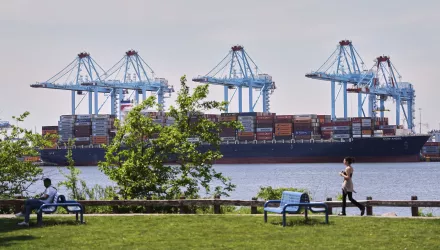Much of the news coverage of Saturday's summit between Presidents Bush and Putin focused on traditional security concerns. But at least as important are the economic relations between the U.S. and Russia. It's time to get this important issue right -- and to end an era dominated by the International Monetary Fund.
A decade ago, there were great -- and unrealistic -- expectations of Russia quickly taking its place alongside the advanced industrial democracies. More than 30 billion Western dollars were dedicated to promoting that vision. Platoons of advisors attempted to use the leverage of multibillion dollar loans, tied to detailed conditions, to reform Russia's economy.
Today, on all sides, there is frustration rooted in the failures of that strategy. Loans wrapped in conditions of uncertain relevance or practicality resulted in mutual deception: The Fund imposing, and Russia accepting, dozens of specific conditions that in practice would not be met. Each year Russia's economy declined further. The flow of official funds shut down. Foreign direct and portfolio investment amounted to less than 10% of similar investment in China.
The present time is propitious for change. Messrs. Bush and Putin have each recognized a common interest in the integration into the global economy of a strong and stable Russia. On the economic front, the steep decline in Russia has been reversed. Spurred by increases in energy prices and a sharply devalued currency, production, exports, and international reserves have all risen sharply. While still fragile, confidence in political stability is growing and a renewed sense of economic opportunity has emerged.
Amid all the oratory about the billions "lost" by the West in Russia, observers have failed to appreciate another fact. Today, the flow of funds runs in the opposite direction. From 1999 to 2001, total Russian payments to official Western creditors will amount to more than $30 billion. Today, there is no need for IMF lending. To a Russian leadership that now takes responsibility for shaping and implementing its own policies, the degree of micro-management and intrusive conditionality characteristic of Fund practice is
unacceptable.
There are strong Russian voices -- beginning with Mr. Putin himself -- aware of the need for closer international economic integration. Recognition of the importance of developing a rule of law, property rights, rational taxation, and a stronger banking system drives the reform program championed by German Gref, the minister of trade and economic development. Obviously, there is resistance. But that will not be overcome by specifying detailed conditions from abroad. What is needed are policies "Made in Russia," implemented by Russian leaders.
What should we do? We can emphasize our readiness to welcome Russia's membership in the World Trade Organization, as soon as -- but not before -- it is able to meet established conditions. We can maintain the normal array of instruments to promote trade and investment, including Export-Import Bank lending, so long as there is interest on the Russian side. We can eschew protectionist constraints on Russian exports, including cartel limits on satellite launches and antidumping limits on steel. We can support normal relationships with the World Bank, when its lending can appropriately support structural
reform.
Beyond that, realism in our bilateral relations should encompass precisely targeted (and adequately audited) financial support for existing programs of mutual interest, including speeding up the dismantling of nuclear and biological weapons, disposing of nuclear waste, and jointly exploring space.
One dark cloud looms on the economic horizon. This year and next, Russia can and should meet its external debt obligations. The years beyond, when the scheduled repayment of debts assumed from the old Soviet Union bunches up, may be different. Scheduled maturities of $45 billion in 2003-2005 pose a challenge for constructive financial diplomacy.
It is too soon to determine whether rescheduling will be necessary, or what form it might take. No one knows how much progress Russia will have made in economic reform, where energy prices will be, or indeed the state of the world economy. But two things should be obvious.
First, useful negotiations will depend upon a clear perception that Russia is indeed moving in the broad direction suggested by Mr. Putin's recent statements. The world will watch for progress in areas such as money laundering, accounting, and treatment of foreign investors.
At the same time, there should be clear recognition of important precedentsand mutual advantages for creditors and debtors alike in stretching out debt payments, if and when the strain of making such payments is destructive of economic stability. The agreements reached by Russia with private "London Club" creditors last year are one example, and forward-looking "Paris Club" members should be considering parallel action.
The basic point is plain. A realistic relationship must not become disengagement. Some might argue that the Russian economy is simply too small today to matter to us, or even that it is not really in our interest to see it flourish. But history offers no precedent for a nation so rich in both natural and human resources to remain irrelevant. Russia is a great country with a strong sense of destiny. Surely it is in our interest that Russia feel secure as an integral part of the world economy. More immediately, a productive economic
relationship is essential if we are to manage inherently difficult security issues.
That is not a question of altruism, or idealism; it is a necessary condition for responsible leadership in a peaceful, globalized world.
---
Mr. Volcker, a former Fed chairman, and Mr. Allison, a professor of government at Harvard's Kennedy School, are co-chairmen of the Council on Foreign Relations task force on Russia.



